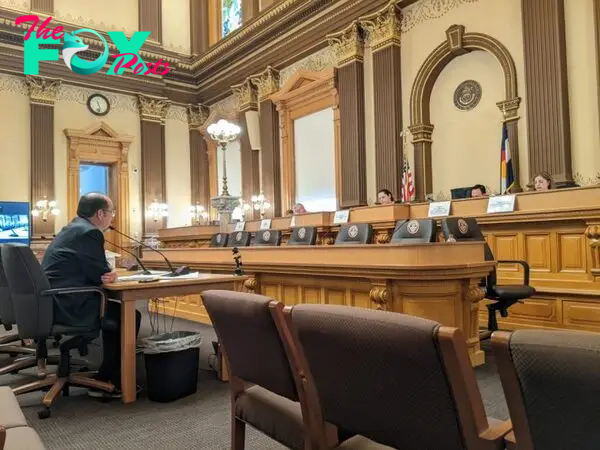Technology
Colorado becomes first state with law regulating potential consumer harms of artificial intelligence

A contentious bill adding guardrails for companies that use artificial intelligence to make big consumer decisions was signed into law Friday by Gov. Jared Polis.
But Polis also took the extra step of writing a letter to lawmakers about his reservations.
“This bill is among the first in the country to attempt to regulate the burgeoning artificial industry on such a scale,” the Democrat wrote. “I appreciate the sponsors’ interest in preventing discrimination and prioritizing consumer protection as Colorado leads in this space.”
But, he added, “I am concerned about the impact this law may have on an industry that is fueling critical technological advancements across our state for consumers and enterprises alike. Government regulation that is applied at the state level in a patchwork across the county can have the effect to tamper innovation and defer competition in an open market.”
There was speculation at the Capitol that Polis may veto the bill, but he said earlier this month that he felt comfortable with the measure because it won’t go into effect for a few years, leaving time for tweaks.
“I’m confident that will leave ample time for any improvements that need to be made prior to it becoming effective,” he told reporters.

Senate Bill 205 aims to reduce discrimination consumers could face when applying for a job, a loan, housing or other services when a machine-based AI system is used to make a “consequential decision.” While other laws exist to protect people of any race, color, gender or other characteristic from intentional discrimination, this law regulates AI systems regardless of intent. A concern is that generative AI systems popularized today by companies like OpenAI don’t always provide accurate answers.
The new law doesn’t go into effect until Feb. 1, 2026.
House Bill 1468, which was also passed by the General Assembly this year, requires the legislature’s Joint Technology Committee to grow to 17 members from 15 and expand its mission to study issues around AI and technology bias. The panel now must include someone who is an expert in generative AI and a person who is an advocate for individuals who have historically experienced discrimination by artificial intelligence and facial recognition technologies
Many in the Colorado technology community spoke out against Senate Bill 205, including the Colorado Technology Association, which represents more than 300 technology companies in the state.
☀️ READ MORE
As new laws are proposed, Colorado companies share how they use AI to make business better
Colorado bill to regulate generative artificial intelligence clears its first hurdle at the Capitol
In “Not Quite Dead Geniuses” diverse life forms create an unusual alliance
CTA shared a letter with The Sun that it sent to Polis on Thursday that called the lawmaking “rushed” with “very little opportunity for the industry to pressure test and provide input.”
CTA remained concerned by the broad definition of AI, which could describe all software, and an amendment allowing appeals by consumers who received an adverse decision. Since consumers won’t know if a decision was the result of algorithmic discrimination, they could appeal any that they don’t like “simply because it was adverse.” That would be a burden on companies and a disincentive for developers to do Business in Colorado.
“Many of these requirements are vague and very broad, and no one seems to have a good understanding of what their application will look like in practice,” the letter said.
The 1,450-member Rocky Mountain AI Interest Group, which was started after OpenAI’s Chat-GPT4 launched an AI chatbot that responded to questions much like a human, also spoke out against the bill as it made its way through the legislature.

“RMAIIG members are still against the law and we’re disappointed it was passed and signed,” Dan Murray, the organization’s founder, said in an email. “We are hopeful, however, that legislators will robustly engage with Colorado’s vibrant AI/tech/startup community over the next 1-2 years to ensure the bill won’t dampen the important tech economy in our state.”
Consumer advocates wanted even greater consumer protections because AI-based discrimination was already occurring — including background checks and resume screening and adjusting auto insurance premiums.
“There are definitely still parts that I don’t like, including what I consider very weak enforcement provisions, a small business exemption that I think is way too broad, and a trade secret exemption that still leaves quite a bit of room for companies to make mischief,” said Matt Scherer, senior policy counsel for the Center for Democracy & Technology, a nonprofit that fights to advance civil rights and liberties in the digital age. “That said, I understand why the bill landed where it did on each of those things, and I think that this bill is as good as I could hope for given that it basically has its origins in model legislation written by an HR tech company.”
Officials with the HR technology company, Workday, said they had engaged with lawmakers in Connecticut and other states but not Colorado. Colorado’s bill was influenced by Connecticut’s, according to one of the bill’s main sponsors, Senate Majority Leader Robert Rodriguez, D-Denver.
But the bill in Connecticut failed, reportedly after a veto threat from the state’s Democratic governor.
-

 Technology1h ago
Technology1h agoApple offers fix after iPhone users report missing iCloud notes | The Express Tribune
-

 Technology17h ago
Technology17h agoBluesky’s rise: why users are migrating from X? | The Express Tribune
-

 Technology1d ago
Technology1d agoNorth Pole shift towards Russia alarms scientists, potentially disrupting smartphone accuracy | The Express Tribune
-

 Technology1d ago
Technology1d agoMajor brands return to X after one-year gap | The Express Tribune
-

 Technology1d ago
Technology1d agoChina tests building Moon base with lunar soil bricks | The Express Tribune
-

 Technology2d ago
Technology2d agoGet chronic UTIs? Future treatments may add more bacteria to your bladder to beat back harmful microbes
-

 Technology2d ago
Technology2d ago2024’s final supermoon visible tonight in Pakistan | The Express Tribune
-

 Technology3d ago
Technology3d agoEU fines Meta €798 million for Facebook Marketplace's 'abusive practices' | The Express Tribune



























